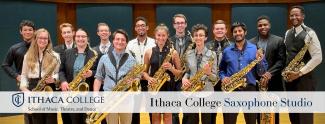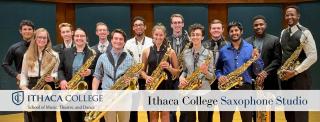Saxophone Audition Requirements

Saxophone Audition Requirements
-
Degree Page: B.M. Composition
Additional Application Requirements:
- Two (2) scores of original works (with sound files, if possible).
Audition Requirements:
- Two (2) contrasting piece (can be movements from a larger work) that demonstrate your ability.
- All major scales, performed from memory (full-range scales, spanning from the lowest Bb to palm F#, are strongly encouraged).
- Sight-reading may be requested.
Interview Requirements:
- Speak with a member of our Composition faculty and ask any specific questions you may have about the Composition degree program.
-
Degree Page: B.M. Jazz Studies
For more information see the B.M. Jazz Studies Audition Requirements page.
-
Degree Page: B.A. Music
Audition Requirements:
- Two (2) contrasting piece (can be movements from a larger work) that demonstrate your ability.
- All major scales, performed from memory (full-range scales, spanning from the lowest Bb to palm F#, are strongly encouraged).
- Sight-reading may be requested.
-
Degree Page: B.M. Music Education
Audition Requirements:
- Two (2) contrasting piece (can be movements from a larger work) that demonstrate your ability.
- All major scales, performed from memory (full-range scales, spanning from the lowest Bb to palm F#, are strongly encouraged).
- Sight-reading may be requested.
Interview Requirements:
-
Speak with a member of our Music Education faculty to discuss any teaching experiences you have had, share any future teaching aspirations, and ask any specific questions you may have about the Music Education degree program. Approximately 10 minutes.
-
Degree Page: B.M. Music in Combination with an Outside Field
Audition Requirements:
- Two (2) contrasting piece (can be movements from a larger work) that demonstrate your ability.
- All major scales, performed from memory (full-range scales, spanning from the lowest Bb to palm F#, are strongly encouraged).
- Sight-reading may be requested.
-
Degree Page: B.M. Performance
Audition Requirements:
- One (1) complete major work - sonata or concerto.
- Two (2) contrasting piece (can be movements from a larger work) that demonstrate your ability.
- All major scales, performed from memory (full-range scales, spanning from the lowest Bb to palm F#, are strongly encouraged).
- Sight-reading may be requested.
-
Degree Page: B.M. Music Education & Performance
Audition Requirements:
- One (1) complete major work - sonata or concerto.
- Two (2) contrasting piece (can be movements from a larger work) that demonstrate your ability.
- All major scales, performed from memory (full-range scales, spanning from the lowest Bb to palm F#, are strongly encouraged).
- Sight-reading may be requested.
Interview Requirements:
-
Speak with a member of our Music Education faculty to discuss any teaching experiences you have had, share any future teaching aspirations, and ask any specific questions you may have about the Music Education degree program. Approximately 10 minutes.
-
Degree Page: B.M. Sound Recording Technology
Pre-screen Requirements:
- Two (2) pieces of contrasting styles.
- Three (3) scales and arpeggios of your choosing.
Audition Requirements:
- Two (2) contrasting piece (can be movements from a larger work) that demonstrate your ability.
- All major scales, performed from memory (full-range scales, spanning from the lowest Bb to palm F#, are strongly encouraged).
- Sight-reading may be requested.
Interview Requirements:
- Meet with members of the SRT faculty, practice critical listening skills, and discuss your background in audio engineering thus far. Approximately 20 minutes.
-
Degree Page: B.M. Sound Recording Technology
For more information see the B.M. Jazz Studies Audition Requirements page.
-
Program Page: Music Minor
Audition Requirements:
- Two (2) contrasting piece (can be movements from a larger work) that demonstrate your ability.
- All major scales, performed from memory (full-range scales, spanning from the lowest Bb to palm F#, are strongly encouraged).
- Sight-reading may be requested.

